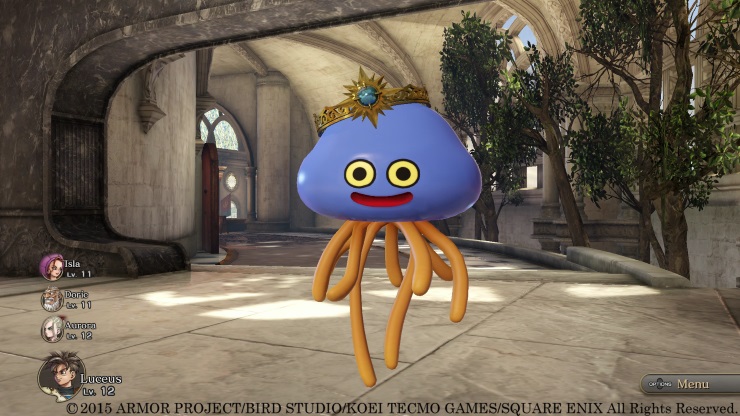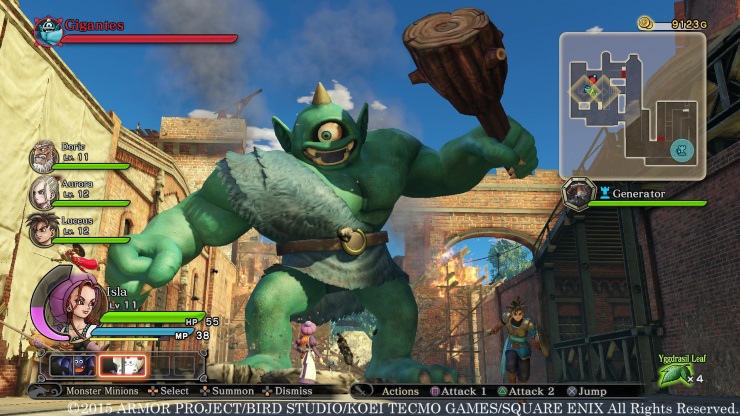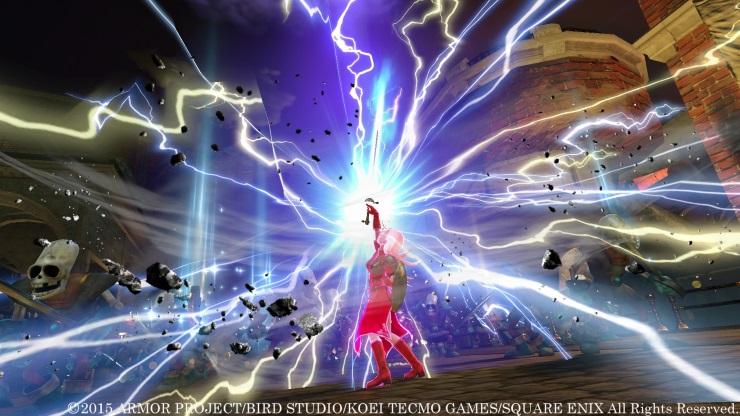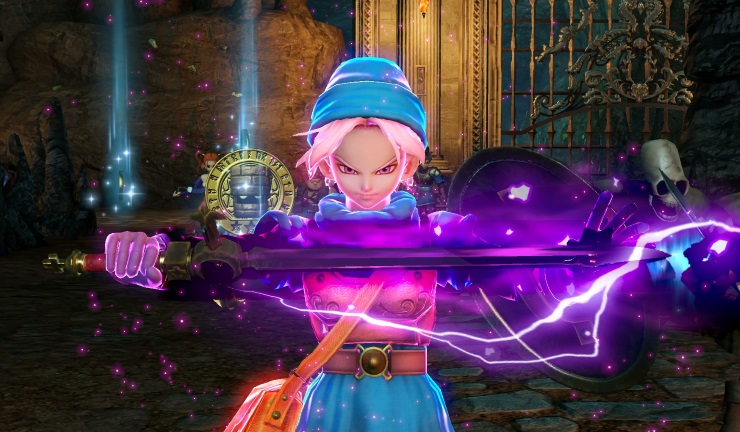October 13, 2015 (NA), October 16, 2015 (EU)
Luceus and Aurora lead a cushty life in the city of Arba; they’re royal guards in a world where humans and monsters live side by side in harmony. Unfortunately, a dastardly villain with a Spanish accent and thin lined moustache has had enough of all this happiness and believes it’s about time that everyone stopped being nice, and sets about turning the kingdom into a huge Battle Royale. There’s also your usual stuff about an ancient evil and chosen children who will save the world, but as stories go Dragon Quest Heroes’ plot is as cookie cutter as they come and the elements of the game continue in this straight-forward manner, with uncomplicated, satisfying gameplay.
Dragon Quest Heroes is a Musou game – from Omega Force (the people who made the Dynasty and Samurai Warriors titles) – where you’re thrown into battles against masses of enemies to fight your way through, and to be fair, it’s considerably more charming than any musou game I’ve played to date.
A lot of Dragon Quest Heroes’ appeal is down to the art style. I’m a big fan of Akira Toriyama’s work across Dragon Age, Chrono Trigger, Dragon Ball and Blue Dragon (I think he likes dragons), and his designs here really shine thanks to the power afforded by the PS4. The expressions across the wide range of characters (many from Dragon Quest games past to join the four new heroes created for this game) really increase their likability. Even enemy monsters that are repeated constantly through palette swapping are hard to tire of due to how well designed (and in turn animated) they are.

The new characters each have their own distinct personalities, too. Luceus is a strategic but long winded thinker, Aurora is the type who wants to jump in sword swinging, Doric is an ever-happy, boisterous loudmouth while Isla is a softly-spoken, flirtatious scientist. They fit quite nicely with the cast of characters plucked from Dragon Quest history, all of which have been voice-cast. It’s really quite nice to hear them all talk, especially Jessica and Yangus (from VIII: Journey of the Cursed King) as the original voice actors reprise their roles. Unfortunately, voice acting is limited mainly to cutscenes and moments in battle, which is a shame.
Locations, too, are excellent, a considerable step up from the bland locales of the Warriors’ games. The large sprawling areas interconnected by pathways and portals are always a pleasure to look at. Even the dark underground city of Grannet exudes a welcoming atmosphere as its darkness is punctuated with a soft blue light; it shows that even the dreariest of locales can be made pretty with the right elements added.
Combat is initially satisfying enough. You and your three fellow party members find yourselves in areas filled with enemies to fight your way through, and it’s great to throw yourself in and watch that hit counter rack up. Building up large combos fills your Tension gauge, which once full can activate a state in which you hit harder, move faster and don’t take damage, making it all the more satisfying to throw yourself into the oncoming horde. Time in this mode is short however, and once it’s over your character performs a “Coup de grâce” which hits all enemies within the immediate area ahead with a powerful blow that’s always a fantastic sight to behold.

Stages are structured with you fighting two or three battles followed by a boss. Regular battles will see you either fighting to clear out all the enemies, or (more frequently) defending a point or person from foes. Enemies spawn from portals which can be shut down by killing the portal keeper, which then stems the tide allowing you to concentrate on other areas, as many portals can be active at any one time. Shutting them down isn’t permanent though, as new portals can re-open constantly, creating a constant ebb and flow to the battle as you move around to prevent the item you’re protecting from receiving damage. To aid you in this, you’re given the ability to befriend monsters during battle. These can then be summoned to defend static points from incoming foes in certain choke points. These monsters do not follow you around, so looking at the lay of the map and placing them to defend vulnerable points is all part of the strategy should you want to succeed in your quest.
These battles can be mixed up a bit with the inclusion of certain level dynamics that require you to move between floors or hit switches to make enemies have to take a different route, but it’s pretty irritating that your party members follow you constantly. While this would normally not be a bad thing, you cannot issue them with orders. So you could find yourself fighting in one location, and realise that you need to activate a switch, but when you go off to do so, your party members come with you, meaning that the enemies you were fighting now have no resistance keeping them at bay. A “stay here” command while you head off to do something like that would have been a very welcome addition. The battles can be rather protracted affairs too: constantly moving back and forward across the paths as another portal spawns and then another can really grind you down. It’s especially galling when you fall at the final hurdle, giving you an “I’ll have to come back to that later” feeling.

It’s probably felt most when you tackle a boss fight, as these are easily the best moments in the game. Taking new elements into account like enemy waves, multiple targets, target prioritisation, and damage-dealing devices, they truly are superb. It’s not often you find yourself wishing that you had a boss fight instead of the regular missions, but it’s a feeling that reoccurs more often than not in Dragon Quest Heroes, such is the strength of design in these encounters.
There’s a multitude of side quests with small rewards for completion that will allow you to get your strength up, but they revolve around visiting the same areas and performing the same actions as the main story encounters, really driving home how infuriating the grind can be. It’s sad really, as it’s good to begin with, but the repetitive nature of the quests can make your enthusiasm wane. At least buying gear, levelling up and managing stats are as good here as in many RPGs. I admit, I always get a kick out of seeing my characters equipped with new gear, and watching their damage output go up.
Dragon Quest Heroes is the best Musou-style game I’ve ever played. It’s full of charm, in the characters and the locations, which makes it much more approachable and gives it a better feel to play. It’s such a shame, then, that mission variation is so sorely lacking – giving you different things to do on a regular basis would make this so much better. It’s good, it really is, but it could have been so much more.
Excellent character designs.
Easy to get into.
Boss fights are excellent.
Repetitive mission structure.
No squad command function.
Dragon Quest Heroes is like watching TV shows on Dave. It’s great at the time, but repeats itself all too often.



